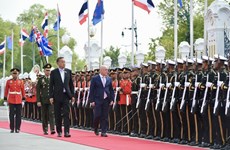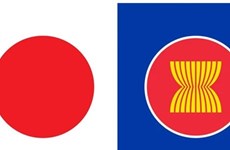Thailand pledges not to sell rubber at lower-than-cost prices
Thai rubber exporters have pledged not to sell their products at prices
lower than production costs, joining efforts of rubber suppliers in
Asia to stop the fall in rubber prices.
Thai rubber exporters have pledged not to sell their products at prices
lower than production costs, joining efforts of rubber suppliers in
Asia to stop the fall in rubber prices.
According to Bloomberg, rubber futures in Tokyo showed a declining trend last month as stockpiles in China, the world largest rubber consumer, rose to a nine-year high.
Meanwhile, the International Rubber Study Group (IRSG) forecast that rubber supply will exceed demand in 2014, the fourth year in a row.
However, Thailand , Indonesia and Malaysia , which produce 70 percent of the world rubber output, have advised other IRSG member countries against selling at the current price levels, saying that output of the next crop could see a strong decrease.
The International Rubber Consortium Limited (IRCo) under the IRSG also said natural rubber prices are unreasonably low. It said it will propose Thailand , Indonesia and Malaysia to enhance a collective supply management plan.
In a related development, Malaysia reported that it exported 83,336 tonnes of natural rubber in December 2013, up 11.5 percent from one year ago. China was the largest importer of Malaysia ’s rubber in the month with 61.9 percent of the volume, followed by Germany with 9.9 percent and the US with 4.9 percent.-VNA
According to Bloomberg, rubber futures in Tokyo showed a declining trend last month as stockpiles in China, the world largest rubber consumer, rose to a nine-year high.
Meanwhile, the International Rubber Study Group (IRSG) forecast that rubber supply will exceed demand in 2014, the fourth year in a row.
However, Thailand , Indonesia and Malaysia , which produce 70 percent of the world rubber output, have advised other IRSG member countries against selling at the current price levels, saying that output of the next crop could see a strong decrease.
The International Rubber Consortium Limited (IRCo) under the IRSG also said natural rubber prices are unreasonably low. It said it will propose Thailand , Indonesia and Malaysia to enhance a collective supply management plan.
In a related development, Malaysia reported that it exported 83,336 tonnes of natural rubber in December 2013, up 11.5 percent from one year ago. China was the largest importer of Malaysia ’s rubber in the month with 61.9 percent of the volume, followed by Germany with 9.9 percent and the US with 4.9 percent.-VNA












